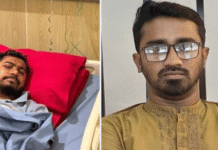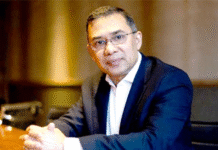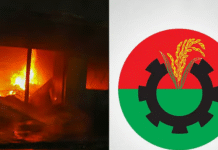
The prosecution earlier submitted the petition to the tribunal seeking steps to accept the recorded statements made by eight listed prosecution witnesses to the investigator as their testimonies against accused the BNP stalwart without cross-examinations for speedy disposal of the case, as three of the witnesses have died and five others remained untraced for long.
The prosecution submitted the plea under section 19 (2) of the International Crimes (Tribunals) Act 1973.
One listed prosecution witness, who now lives in India, and all the three expired prosecution witnesses’ recorded statements have been accepted as their evidence against the accused, said the tribunal order.
The four witnesses whose recorded statements have been accepted are Badal Biswas, now living in India, and late Janati Bala Pal, Jyotsna Bala Chowdhury and Badshah Miah, according to the prosecution.
The ICT provision says: “A tribunal may receive in evidence any statement recorded by a magistrate or an investigation officer being a statement made by any person who, at the time of the trial, is dead or whose attendance cannot be procured without an amount of delay or expense which the tribunal considers unreasonable.”
Reacting to the tribunal order, designated prosecutor Sultan Mahmud Simon told UNB that they are more or less satisfied with the court’s order. He said: “The trial process would be expedited following the order.”
The tribunal, however, turned down another prosecution plea – that of accepting an additional document made by the investigator in support of its case – as it was not submitted within the stipulated timeframe under the International Crimes (Tribunals) Act 1973.
Meanwhile, designated Investigator ASP M Nurul Islam concluded his deposition before the three-member tribunal, headed by Justice ATM Fazle Kabir, against accused Salauddin Quader Chowdhury as the last prosecution witness (PW-41).
As the deposition was over, defence counsel Barrister Fakhrul Islam, instead of cross-examining the investigator, prayed for a 10-day adjournment for preparation and further consultation with the accused in connection with the case, since the IO is the most important witness.
Partly allowing the defence plea, the tribunal adjourned cross-examination for Monday next (June 3).
During his deposition, Investigator Nurul Islam told the tribunal that after examining the investigation report and available supporting papers and documents, prima facie it was found that the father of the accused Fazlul Quader Chowdhury, then Convention Muslim League chief, had politically backed the rule of the Pakistan junta as a collaborator. Denying the 1971 War of Bangladesh’s Liberation, he had perpetrated covertly or overtly the crimes against humanity in collaboration with the occupation Pakistan army during the nine months of the war, said the investigator.
PW-41 Nurul Islam, the IO, said accused Salauddin Quader Chowdhury also had followed his father’s political ideology and committed similar crimes against
humanity under section 3 (a) (b) and (c) of the International Crimes (Tribunals) Act 1973 in collaboration with the Pakistan occupation army, including genocide, killing, extermination of Hindu minority groups, deportation, persecution and abduction in port city Chittagong district.









